The Moon Men (10)
By:
August 29, 2013
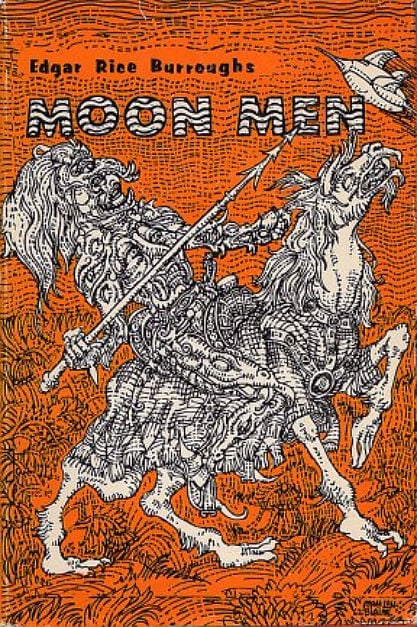
HILOBROW is pleased to present the tenth installment of our serialization of “The Moon Men,” a science fiction story by Edgar Rice Burroughs — best known for his Tarzan and John Carter stories — that was first serialized in Argosy All-Story Weekly in 1925. It is the second section of The Moon Maid saga, which gallops from Julian 5th’s crash-landing on the moon, where he encounters subhuman Kalkars who dwell in the asteroid’s hollow interior; to the same Julian’s doomed effort to defeat a Kalkar invasion of Earth; to the final triumph of Red Hawk (Julian 20th), the leader of a tribe of near-savage freedom-fighters. The “Moon Men” section follows Julian 9th’s rebellion against the descendants of the Moon Men. New installments will appear each Thursday for 11 weeks.
ALL EXCERPTS: 1 | 2 | 3 | 4 | 5 | 6 | 7 | 8 | 9 | 10 | 11
SUBSCRIBE to HILOBROW’s serialized fiction via RSS.
CHAPTER TEN: REVOLUTION
Then they threw me into the pen where the prisoners were kept and after they had left I was surrounded by the other unfortunates incarcerated there. When they learned what I had done they shook their heads and sighed. It would be all over with me in the morning, they said — nothing less than the butcher for such an offense as mine.
I lay upon the hard ground, bruised and sore, thinking not of my future but of what was to befall Juana and mother if I, too, were taken from them. The thought gave me new strength and made me forget my hurts, for my mind was busy with plans, mostly impossible plans, for escape — and vengeance. Vengeance was often uppermost in my mind.
Above my head, at intervals, I heard the pacing of the sentry upon the roof. I could tell, of course, each time that he passed and the direction in which he was going. It required about five minutes for him to pass above me, reach the end of his post and return — that was when he went west. Going east he took but a trifle over two minutes. Therefore, when he passed me going west his back was toward me for about two and a half minutes; but when he went east it was only for about a minute that his face was turned from the spot where I lay.
Of course, he could not see me while I lay beneath the shed; but my plan — the one I finally decided upon — did not include remaining in the shed. I had evolved several subtle schemes for escape; but finally cast them all aside and chose, instead, the boldest that occurred to me. I knew that at best the chances were small that I could succeed in my plan and therefore the boldest seemed as likely as any other and it at least had the advantage of speedy results. I would be free or I would be dead in a few brief moments after I essayed it.
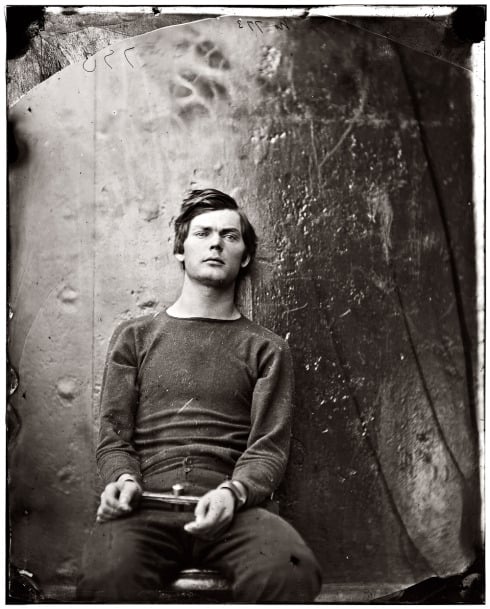
I waited, therefore, until the other prisoners had quieted down and comparative silence in the direction of the barracks and the parade assured me that there were few abroad. The sentry came and went and came again upon his monotonous round. Now he was coming toward me from the east and I was ready, standing just outside the shed beneath the low eaves which I could reach by jumping. I heard him pass and gave him a full minute to gain the distance I thought necessary to drown the sounds of my attempt from his ears. Then I leaped for the eaves, caught with my fingers and drew myself quickly to the roof.
I thought that I did it very quietly, but the fellow must have had the ears of a Hellhound for no more had I drawn my feet beneath me for the quick run across the roof than a challenge rang out from the direction of the sentry and almost simultaneously the report of a rifle.
Instantly all was pandemonium. Guards ran, shouting, from all directions, lights flashed in the barracks, rifles spoke from either side of me and from behind me, while from below rose the dismal howlings of the prisoners. It seemed then that a hundred men had known of my plan and been lying in wait for me; but I was launched upon it and even though I had regretted it, there was nothing to do but carry it through to whatever was its allotted end.
It seemed a miracle that none of the bullets struck me; but, of course, it was dark and I was moving rapidly. It takes seconds to tell about it; but it required less than a second for me to dash across the roof and leap to the open ground beyond the prison pen. I saw lights moving west of me and so I ran east toward the lake and presently the firing ceased as they lost sight of me, though I could hear sounds of pursuit. Nevertheless, I felt that I had succeeded and was congratulating myself upon the ease with which I had accomplished the seemingly impossible when there suddenly rose before me out of the black night the figure of a huge soldier pointing a rifle point blank at me. He issued no challenge nor asked any question — just pulled the trigger. I could hear the hammer strike the firing pin; but there was no explosion. I did not know what the reason was, nor did I ever know. All that was apparent was that the rifle misfired and then he brought his bayonet into play while I was springing toward him.
Foolish man! But then he did not know that it was Julian 9th he faced. Pitifully, futilely he thrust at me and with one hand I seized the rifle and tore it from his grasp. In the same movement I swung it behind me and above my head, bringing it down with all the strength of one arm upon his thick skull. Like a felled ox he tumbled to his knees and then sprawled forward upon his face. He never knew how he died.
Behind me I heard them coming closer and they must have seen me, for they opened fire again and I heard the beat of horses’ hoofs upon my right and left. They were surrounding me upon three sides and upon the fourth was the great lake. A moment later I was standing upon the edge of the ancient breakwater while behind me rose the triumphant cries of my pursuers. They had seen me and they knew that I was theirs.
At least, they thought they knew so. I did not wait for them to come closer; but raising my hands above me I dove head foremost into the cool waters of the lake. Swimming rapidly beneath the surface I kept close in the shadows and headed north.
I had spent much of my summer life in the water of the river so that I was much at home in that liquid element as in air, but this, of course, the Kash Guard did not know, for even had they known that Julian 9th could swim they could not at that time have known which prisoner it was who had escaped and so I think they must have thought what I wanted them to think — that I had chosen self-drowning to recapture.
However, I was sure they would search the shore in both directions and so I kept to the water after I came to the surface. I swam farther out until I felt there was little danger of being seen from shore, for it was a dark night. And thus I swam on until I thought I was opposite the mouth of the river when I turned toward the west, searching for it.
Luck was with me. I swam directly into it and a short distance up the sluggish stream before I knew that I was out of the lake; but even then I did not take to the shore, preferring to pass the heart of the ancient city before trusting myself to land.
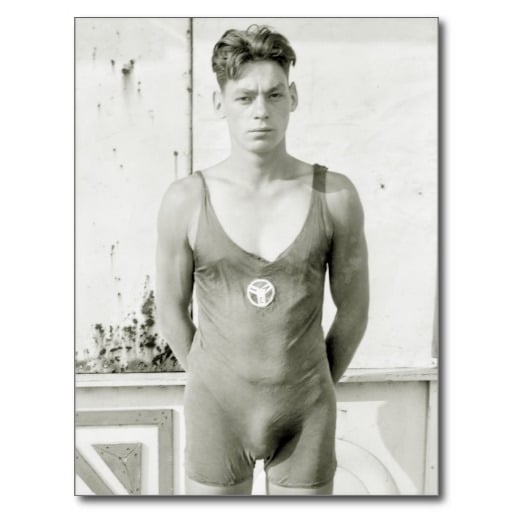
At last I came out upon the north bank of the river, which is farthest from the Kash Guard barracks, and made my way as swiftly as possible up stream in the direction of my home. Here, hours later, I found an anxious Juana awaiting me, for already she had heard what had transpired in the market place. I had made my plans and had soon explained them to Juana and mother. There was nothing for them but to acquiesce, as only death could be our lot if we remained in our homes another day. I was astonished, even, that they had not already fallen upon Juana and mother. As it was they might come any minute. There was no time to lose.
Hastily wrapping up a few belongings I took the Flag from its hiding place above the mantel and tucked it in my shirt — then we were ready. Going to the pens we caught Red Lightning and the two mares and three of my best milk goats. These latter we tied and after Juana and mother had mounted the mares I laid one goat in front of each across a mare’s withers and the third before myself upon Red Lightning, who did not relish the strange burden and gave me considerable trouble at first.
We rode out up river, leaving the pens open that the goats might scatter and possibly cover our trail until we could turn off the dusty path beyond Jim’s house. We dared not stop to bid Jim and Mollie goodbye lest we be apprehended there by our enemies and bring trouble to our good friends. It was a sad occasion for poor mother, leaving thus her home and those dear neighbors who had been as close to her as her own; but she was as brave as Juana.
Not once did either of them attempt to dissuade me from the wild scheme I had outlined to them. Instead, they encouraged me and Juana laid her hand upon my arm as I rode beside her, saying: “I would rather that you died thus than that we lived on as downtrodden serfs, without happiness and without hope.”
“I shall not die,” I said, “until my work is done, at least. Then if die I must I shall be content to know that I leave a happier country for my fellow men to live in.”
“Amen!” whispered Juana.
That night I hid them in the ruins of the old church, which we found had been partially burned by the Kalkars. For a moment I held them in my arms — my mother, and my wife — and then I left them to ride toward the southwest and the coal mines. The mines lie about fifty miles away and west of south according to what I had heard. I had never been to them; but I knew that I must find the bed of an ancient canal and follow it through the district of Joliet and between fifteen and twenty miles beyond, where I must turn south and, after passing a large lake, I would presently come to the mines. I rode the balance of the night and into the morning until I commenced to see people astir in the thinly populated country through which I passed.
Then I hid in a wood through which a stream wound and here, found pasture for Red Lightning and rest for myself. I had brought no food, leaving what little bread and cheese we had brought from the house for mother and Juana. I did not expect to be gone over a week and I knew that with goat’s milk and what they had on hand in addition to what they could find growing wild, there would be no danger of starvation before I returned — after which we expected to live in peace and plenty for the rest of our days.
My journey was less eventful than I had anticipated. I passed through a few ruined villages and towns of greater or less antiquity, the largest of which was ancient Joliet, which was abandoned during the plague fifty years ago, the Teivos headquarters and station being removed directly west a few miles to the banks of a little river. Much of the territory I traversed was covered with thick woods, though here and there were the remnants of clearings which were not yet entirely reclaimed by nature. Now and again I passed those gaunt and lonely towers in which the ancients stored the winter feed for their stock. Those that have endured were of concrete and some showed but little the ravages of time, other than the dense vines that often covered them from base to capital, while several were in the midst of thick forests with old trees almost entwining them, so quickly does Nature reclaim her own when man has been displaced.
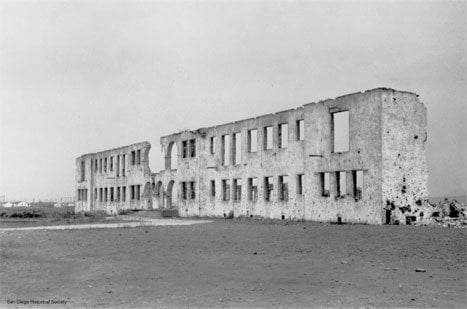
After I passed Joliet I had to make inquiries. This I did boldly of the few men I saw laboring in the tiny fields scattered along my way. They were poor clods, these descendants of ancient America’s rich and powerful farming class.
Early in the second morning I came within sight of the stockade about the mines. Even at a distance I could see that it was a weak, dilapidated thing and that the sentries pacing along its top were all that held the prisoners within.
As a matter of fact, many escaped; but they were soon hunted down and killed as the farmers in the neighborhood always informed on them. The commandant at the prison had conceived the fiendish plan of slaying one farmer for every prisoner who escaped and was not recaught.
I hid until night and then, cautiously, I approached the stockade, leaving Red Lightning securely tied in the woods. It was no trick to reach the stockade, so thoroughly was I hidden by the rank vegetation growing upon the outside. From a place of concealment I watched the sentry, a big fellow; but apparently a dull clod who walked with his chin upon his breast and with the appearance of being half asleep.
The stockade was not high and the whole construction was similar to that of the prison pen at Chicago, evidently having been designed by the same commandant in years gone by. I could hear the prisoners conversing in the shed beyond the wall and presently when one came near to where I listened I tried to attract his attention by making a hissing sound.
After what seemed a long time to me, he heard me; but even then it was some time before he appeared to grasp the idea that some one was trying to attract his attention. When he did he moved closer and tried to peer through one of the cracks; but as it was dark out he could see nothing.
“Are you a Yank?” I asked. “If you are I am a friend.”
“I am a Yank,” he replied. “Did you expect to find a Kalkar working in the mines?”
“Do you know a prisoner called Julian 8th?” I inquired.
He seemed to be thinking for a moment and then he said: “I seem to have heard the name. What do you want of him?”
“I wait to speak to him — I am his son.”
“Wait!” he whispered. “I think that I heard a man speak that name today. I will find out — he is near by.”
I waited for perhaps ten minutes when I heard some one approaching from the inside and presently a voice asked if I was still there.
“Yes,” I said. “Is that you, father?” for I thought that the tones were his.
“Julian, my son!” came to me almost as a sob. “What are you doing here?”
Briefly I told him and then of my plan. “Have the convicts the courage to attempt it?” I asked, in conclusion.
“I do not know,” he said, and I could not but note the tone of utter hopelessness in his voice. “They would wish to; but here our spirits and our bodies both are broken. I do not know how many would have the courage to attempt it. Wait and I will talk with some of them — all are loyal; but just weak from overwork, starvation and abuse.”
I waited for the better part of an hour before he returned. “Some will help,” he said, “from the first, and others if we are successful. Do you think it worth the risk — they will kill you if you fail — they will kill us all.”
“And what is death to that which you are suffering?” I asked.
“I know,” he said, “but the worm impaled upon the hook still struggles and hopes for life. Turn back, my son; we can do nothing against them.”
“I will not turn back,” I whispered. “I will not turn back.”
“I will help you; but I cannot speak for the others. They may and they may not.”
We had spoken only when the sentry had been at a distance, falling into silence each time he approached the point where we stood. In the intervals of silence I could hear the growing restlessness of the prisoners and I guessed that what I had said to the first man was being passed around from mouth to mouth within until already the whole adjacent shed was seething with something akin to excitement. I wondered if it would arouse their spirit sufficiently to carry them through the next ten minutes. If it did success was assured.
Father had told me all that I wanted to know — the location of the guard house and the barracks and the number of Kash Guard posted here — only fifty men to guard five thousand! How much more eloquently than words did this fact bespeak the humiliation of the American people and the utter contempt in which our scurvy masters hold us — fifty men to guard five thousand!
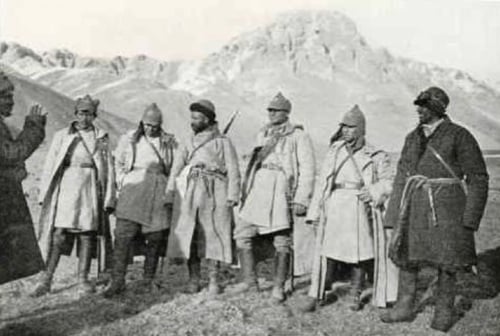
And then I started putting my plan into execution — a mad plan which had only its madness to recommend it. The sentry approached and came opposite where I stood and I leaped for the eaves as I had leaped for the eaves of the prison pen at Chicago, only this time I leaped from the outside where the eaves are closer to the ground and so the task was easier. I leaped and caught hold. Then I scrambled up behind the sentry and before his dull wits told him that there was some one behind him I was upon his back and the same fingers that threw a mad bull closed upon his windpipe. The struggle was brief — he died quickly and I lowered him to the roof. Then I took his uniform from him and donned it, with his ammunition belt, and I took his rifle and started out upon his post, walking with slow tread and with my chin upon my breast as he had walked.
At the end of my post I waited for the sentry I saw coming up and when he was close to me I turned back and he turned back away from me. Then I wheeled and struck him an awful blow upon the head with my rifle. He died more quickly than the other — instantly, I should say.
I took his rifle and ammunition from him and lowered them inside the pen to waiting hands. Then I went on to the next sentry, and the next, until I had slain five more and passed their rifles to the prisoners below. While I was doing this five prisoners who had volunteered to father climbed to the roof of the shed and stripped the dead men of their uniforms and donned them.
It was all done quietly and in the black night none might see what was going on a few feet away. I had to stop when I came near to the guard house. There I turned back and presently slid into the pen with my accomplices who had been going among the other prisoners with father arousing them to mutiny. Now were most of them ready to follow me, for so far my plan had proven successful. With equal quietness we overcame the men at the guard house and then moved on in a silent body toward the barracks.
So sudden and so unexpected was our attack that we met with little resistance. We were almost five thousand to forty now. We swarmed in upon them like wild beasts upon a foe and we shot them and bayonetted them until none remained alive. Not one escaped. And now we were flushed with success so that the most spiritless became a veritable lion for courage.
We who had taken the uniform of the Kash Guard discarded them for our own garb, as we had no mind to go abroad in the hated livery of our oppressors. That very night we saddled their horses with the fifty saddles that were there and fifty men rode the balance of the horses bareback. That made one hundred mounted men and the others were to follow on foot — to Chicago. “On to Chicago!” was our slogan.
We traveled cautiously, though I had difficulty in making them do so, so intoxicated were they with their first success. I wanted to save the horses and also I wanted to get as many men into Chicago as possible, so we let the weakest ride, while those of us who were strong walked, though I had a time of it getting Red Lightning to permit another on his sleek back.
Some fell out upon the way from exhaustion or from fear, for the nearer Chicago we approached the more their courage ebbed. The very thought of the feared Kalkars and their Kash Guard took the marrow from the bones of many. I do not know that one may blame them, for the spirit of man can endure only so much and when it is broken only a miracle can mend it in the same generation.
We reached the ruined church a week from the day I left mother and Juana there and we reached it with less than two thousand men, so rapid had been the desertion in the last few miles before we entered the district.
Father and I could scarcely wait to see our loved ones and so we rode on ahead to greet them, and inside the church we found three dead goats and a dying woman — my mother with a knife protruding from her breast. She was still conscious when we entered and I saw a great light of happiness in her eyes as they fell upon father and upon me. I looked around for Juana and my heart stood still, fearing that I would not find her — and fearing that I would.
Mother could still speak, and as we leaned over her as father held her in his arms she breathed a faint story of what had befallen them. They had lived in peace until that very day when the Kash Guard had stumbled upon them — a large detachment under Or-tis himself. They had seized them to take them away; but mother had had a knife hidden in her clothing and had utilized it as we saw rather than suffer the fate she knew awaited them. That was all, except that Juana had had no knife and Or-tis had carried her off.
I saw mother die, then, in father’s arms and I helped him bury her after our men came and we had shown them what the beasts had done, though they knew well enough and had suffered themselves enough to know what was to be expected of the swine.
* “Vengeance was often uppermost in my mind.” — This story belongs to what is known as the “Avenger” genre of adventure tales.
RADIUM AGE SCIENCE FICTION: “Radium Age” is HILOBROW’s name for the 1904–33 era, which saw the discovery of radioactivity, the revelation that matter itself is constantly in movement — a fitting metaphor for the first decades of the 20th century, during which old scientific, religious, political, and social certainties were shattered. This era also saw the publication of genre-shattering writing by Edgar Rice Burroughs, Sax Rohmer, E.E. “Doc” Smith, Jack London, Arthur Conan Doyle, Aldous Huxley, Olaf Stapledon, Karel Čapek, H.P. Lovecraft, Charlotte Perkins Gilman, Yevgeny Zamyatin, Philip Gordon Wylie, and other pioneers of post-Verne/Wells, pre-Golden Age “science fiction.” More info here.
READ GORGEOUS PAPERBACKS: HiLoBooks has reissued the following 10 obscure but amazing Radium Age science fiction novels in beautiful print editions: Jack London’s The Scarlet Plague, Rudyard Kipling’s With the Night Mail (and “As Easy as A.B.C.”), Arthur Conan Doyle’s The Poison Belt, H. Rider Haggard’s When the World Shook, Edward Shanks’ The People of the Ruins, William Hope Hodgson’s The Night Land, J.D. Beresford’s Goslings, E.V. Odle’s The Clockwork Man, Cicely Hamilton’s Theodore Savage, and Muriel Jaeger’s The Man with Six Senses. For more information, visit the HiLoBooks homepage.
SERIALIZED BY HILOBOOKS: Jack London’s The Scarlet Plague | Rudyard Kipling’s With the Night Mail (and “As Easy as A.B.C.”) | Arthur Conan Doyle’s The Poison Belt | H. Rider Haggard’s When the World Shook | Edward Shanks’ The People of the Ruins | William Hope Hodgson’s The Night Land | J.D. Beresford’s Goslings | E.V. Odle’s The Clockwork Man | Cicely Hamilton’s Theodore Savage | Muriel Jaeger’s The Man With Six Senses | Jack London’s “The Red One” | Philip Francis Nowlan’s Armageddon 2419 A.D. | Homer Eon Flint’s The Devolutionist | W.E.B. DuBois’s “The Comet” | Edgar Rice Burroughs’s The Moon Men | Charlotte Perkins Gilman’s Herland | Sax Rohmer’s “The Zayat Kiss” | Eimar O’Duffy’s King Goshawk and the Birds | Frances Hodgson Burnett’s The Lost Prince | Morley Roberts’s The Fugitives | Helen MacInnes’s The Unconquerable | Geoffrey Household’s Watcher in the Shadows | William Haggard’s The High Wire | Hammond Innes’s Air Bridge | James Branch Cabell’s Jurgen | John Buchan’s “No Man’s Land” | John Russell’s “The Fourth Man” | E.M. Forster’s “The Machine Stops” | John Buchan’s Huntingtower | Arthur Conan Doyle’s When the World Screamed | Victor Bridges’ A Rogue By Compulsion | Jack London’s The Iron Heel | H. De Vere Stacpoole’s The Man Who Lost Himself | P.G. Wodehouse’s Leave It to Psmith | Richard Connell’s “The Most Dangerous Game” | Houdini and Lovecraft’s “Imprisoned with the Pharaohs” | Arthur Conan Doyle’s “The Sussex Vampire”.
ORIGINAL FICTION: HILOBROW has serialized three novels: James Parker’s The Ballad of Cocky The Fox (“a proof-of-concept that serialization can work on the Internet” — The Atlantic); Karinne Keithley Syers’s Linda Linda Linda (which includes original music); and Robert Waldron’s roman à clef The School on the Fens. We also publish original stories and comics. These include: Matthew Battles’s stories “Gita Nova“, “Makes the Man,” “Imago,” “Camera Lucida,” “A Simple Message”, “Children of the Volcano”, “The Gnomon”, “Billable Memories”, “For Provisional Description of Superficial Features”, “The Dogs in the Trees”, “The Sovereignties of Invention”, and “Survivor: The Island of Dr. Moreau”; several of these later appeared in the collection The Sovereignties of Invention | Peggy Nelson’s “Mood Indigo“, “Top Kill Fail“, and “Mercerism” | Annalee Newitz’s “The Great Oxygen Race” | Flourish Klink’s Star Trek fanfic “Conference Comms” | Charlie Mitchell’s “A Fantasy Land” | Charlie Mitchell’s “Sentinels” | Joshua Glenn’s “The Lawless One”, and the mashup story “Zarathustra vs. Swamp Thing” | Adam McGovern and Paolo Leandri’s Idoru Jones comics | John Holbo’s “Sugarplum Squeampunk” | “Another Corporate Death” (1) and “Another Corporate Death” (2) by Mike Fleisch | Kathryn Kuitenbrouwer and Frank Fiorentino’s graphic novel “The Song of Otto” (excerpt) | John Holbo’s graphic novel On Beyond Zarathustra (excerpt) | “Manoj” and “Josh” by Vijay Balakrishnan | “Verge” by Chris Rossi, and his audio novel Low Priority Hero | EPIC WINS: THE ILIAD (1.408-415) by Flourish Klink | EPIC WINS: THE KALEVALA (3.1-278) by James Parker | EPIC WINS: THE ARGONAUTICA (2.815-834) by Joshua Glenn | EPIC WINS: THE MYTH OF THE ELK by Matthew Battles | TROUBLED SUPERHUMAN CONTEST: Charles Pappas, “The Law” | CATASTROPHE CONTEST: Timothy Raymond, “Hem and the Flood” | TELEPATHY CONTEST: Rachel Ellis Adams, “Fatima, Can You Hear Me?” | OIL SPILL CONTEST: A.E. Smith, “Sound Thinking | LITTLE NEMO CAPTION CONTEST: Joe Lyons, “Necronomicon” | SPOOKY-KOOKY CONTEST: Tucker Cummings, “Well Marbled” | INVENT-A-HERO CONTEST: TG Gibbon, “The Firefly” | FANFICTION CONTEST: Lyette Mercier’s “Sex and the Single Superhero”
